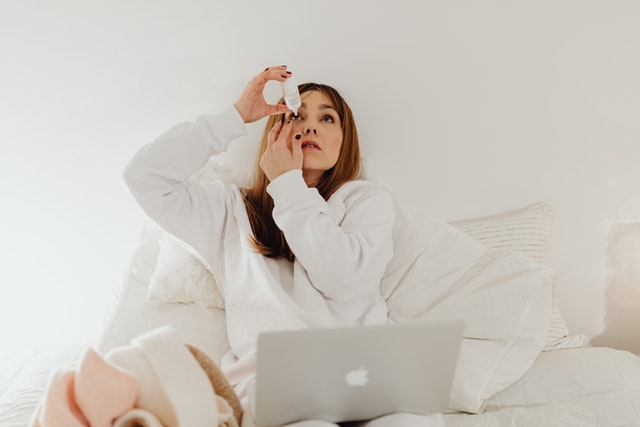When your eyesight starts to get worse, many believe it’s the inevitable result of either aging or extreme strain on the eyes. You want to better care for your eyes as it is one of the most important, if not the most valuable, sense organs you have.
Eye health tends to be among the easiest to overlook, but it’s also crucial in your daily life. Here are seven eye health nutrition tips you can follow, so you keep your vision clear for years to come.
1: Eat Omega-3 Rich Foods
Eating foods that are rich in omega-3s helps support a healthy retina. The macula is what allows you to see details clearly, while the retina is the outer portion of the eyeball that receives light and sends images to the brain. The blood vessels in your eye are better supported when your diet is replete with healthy foods like nuts, salmon, and leafy greens.
Make sure to eat fatty fish like salmon, tuna, and mackerel, but include more plant-based foods in your diet. Polyunsaturated fats like walnuts, flaxseed, and chia seeds can help lower your risk of macular degeneration and cataracts.
2: Get Plenty of Vitamin C
Your diet should include foods high in vitamin C. This vitamin is a powerful antioxidant and a known defender against free radicals. In addition to reducing the risk of age-related macular degeneration, cancer, and cataracts also helps increase your body’s ability to fight infection.
The richest sources of vitamin C come from citrus fruits and juices, kiwi, strawberries, and broccoli. These fruits and vegetables will help to keep your immune system strong, which improves the health of all parts of your body. All good options are red peppers, dark leafy green veggies, broccoli, oranges, strawberries, and papaya.
Another known benefit of a good amount of vitamin c is reducing blood pressure. If you suffer from high blood pressure, it may be helpful to include more foods that contain this nutrient in your daily routine. Vitamin C is also fantastic for people with dry skin.
3: Drink Water
It might seem common sense, but drinking enough water is critical to maintaining a healthy vision. However, many people don’t drink nearly enough. Drink plenty of water to maintain good eyesight and overall health. It’s also a good idea to avoid sodas, energy drinks, and sports drinks which often contain high amounts of sugar and artificial ingredients.
Your vision may be improved by drinking lots of water. Drinking fluids daily can help your entire body, including your eyes and ears.
Dehydration can cause dry eyes. Dry eyes are a common problem for many people, particularly those who work in dry environments. If work causes you to experience dryness regularly, make sure your eye doctor is aware of the problem.
The production of tears requires an adequate supply of water and nutrients, and inadequate hydration can lead to a deficiency.
4: Use Supplements If Necessary
If your eyes show signs of wear and tear or you simply want to keep your eyes healthy for longer, you may benefit from taking supplements. Taking supplements can fill in the gaps that a healthy diet might not fill.
Look for nutritional supplements that contain vitamins A, C, E, and zinc. Vitamin A and lutein are two essential vitamins that keep your eyes in top shape.
Lutein might help prevent early glaucoma and help maintain sharp, central, and normal night vision. This key nutritional component is in dark green and yellow vegetables and egg yolks.
Talk to your doctor before making a final decision on whether or not you should take them.
5: Watch Out for Alcohol Consumption
Many people don’t realize that alcohol can negatively affect the health of your eyes and that it can lead to blindness. Studies have found that people who consume large amounts of alcohol can suffer damage to their optic nerves. This damage may lead to problems later in life.
Instead of ordering a glass of wine or a beer with dinner, try drinking a glass of water. Drinking water can help you stay hydrated and reduce your chances of stroke or a heart attack.
6: Control Your Sugar Consumption
Too much sugar in a person’s body can encourage the growth of dangerous bacteria. This can lead to problems such as diabetic retinopathy, which can cause permanent loss of sight. It can also cause impaired healing, a severe problem after eye surgery.
High blood sugar levels can damage your tiny retinal cells, which are known as ganglion cells and are crucial to your ability to see. This is referred to as diabetic retinopathy and can be detrimental to your overall eye health.
The condition is common among people who have diabetes. It is one of the most common causes of vision loss in people 20 years of age or older. While there is no treatment for the condition, your doctor might be able to slow the progression of the disease. When caught in its early stages, you can prevent loss of sight.
7: Control Your Weight
Obesity is a risk factor for several health conditions, and this includes various diseases of the eye. Being overweight can increase your chances of suffering from diabetic macular edema, a condition in which fluid builds up in the eyes of people with diabetes.
This buildup can interfere with the transmission of visual information from the back part of the eye to your brain. This can cause you to lose your peripheral or side-to-side vision of objects.
People who are obese are also at increased risk of developing retinopathy. This condition occurs when the small vessels in the back of your eyeballs become damaged due to high blood sugar. The excess glucose in your blood can enter your bloodstream through the capillaries in the backs of the eyes.
The risk for this condition increases as your weight rises. Exercising, losing weight, and reducing your intake of carbohydrates and sugars are all ways to combat the threats of obesity.
Final Thoughts
Taking care of your health isn’t just crucial to staying alive; it’s also critical to looking and feeling your best. The condition of your eyes will affect how you look and feel.
Your best defense against poor vision has a healthy lifestyle. Take the necessary steps to improve your diet and physical activity levels. Keeping an eye on your nutrition and lifestyle choices is your best approach to keeping yourself healthy and seeing well.
 Author bio: Bash Sarmiento is a writer and an educator from Manila. He writes laconic pieces in the education, lifestyle, and health realms. His academic background and extensive experience in teaching, textbook evaluation, business management, and traveling are translated into his works.
Author bio: Bash Sarmiento is a writer and an educator from Manila. He writes laconic pieces in the education, lifestyle, and health realms. His academic background and extensive experience in teaching, textbook evaluation, business management, and traveling are translated into his works.
Links:




Leave Comment